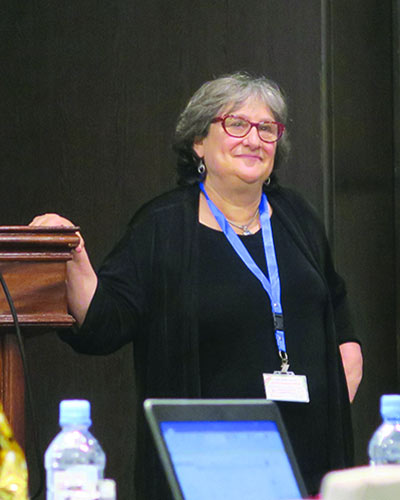November 27, 2017

Diarrheal disease kills one in nine children globally, with the highest mortality in sub-Saharan Africa and South Asia. Karen Kotloff, MD, a pediatric infectious disease specialist at the Center for Vaccine Development (CVD) at the University of Maryland School of Medicine is leading the Vaccine Impact on Diarrhea in Africa (VIDA) study, a follow-on study to the Global Enteric Multicenter Study (GEMS), the largest, most comprehensive study of childhood diarrheal diseases. Data from GEMS identified five pathogens, rotavirus, Cryptosporidium, Shigella, enterotoxigenic E. coli, and adenovirus 40/41 that cause 50 percent of moderate-to-severe diarrhea (MSD) in children under five with rotavirus the leading cause across sites in Africa and Asia.
The VIDA project began 14 to 21 months after rotavirus vaccines were introduced at sites in The Gambia, Mali, and Kenya in 2013 and 2014. The goal of the VIDA study is to compare data before and after rotavirus vaccine introduction to assess the impact of the rotavirus vaccine on the etiology and incidence of MSD in children 0 to 59 months.
The first two years of data on etiology, clinical outcomes, and impact of rotavirus vaccine introduction were presented at ASTMH.
- Richard Omore, the Principal Investigator in Kenya, presented changes in etiology and incidence among under-five diarrhea after rotavirus vaccine introduction in Africa. In all three countries, rotavirus remains a common pathogen in infants, but is no longer the leading pathogen at any site. There was a marked decrease in rotavirus incidence in Kenya and Mali, but not The Gambia. The same five pathogens seen most often in GEMS continue to be the most common in VIDA.
- Jahangir Hossan, the Principal Investigator in The Gambia, presented under five diarrheal morbidity and mortality before and after introduction of rotavirus vaccine. While there has been an overall decline in both persistent diarrhea and mortality, an episode of MSD continues to be associated with significant linear growth faltering and mortality. Nonetheless, both the proportion of rotavirus cases that developed persistent diarrhea and the case fatality rate of rotavirus significantly decreased.
- Adama Mamby Keita, Head of Epidemiology at CVD-Mali, presented the impact and effectiveness of rotavirus vaccine on reducing diarrhea among children under five. Using a test negative case control design, researchers have been unable to measure vaccine effectiveness due to high vaccine coverage. A modest positive impact can be seen consistently in the infant age group.
The researchers will continue to collect data for another year and look forward to sharing results from the complete data set.
Contact
Office of Public Affairs
655 West Baltimore Street
Bressler Research Building 14-002
Baltimore, Maryland 21201-1559
Contact Media Relations
(410) 706-5260